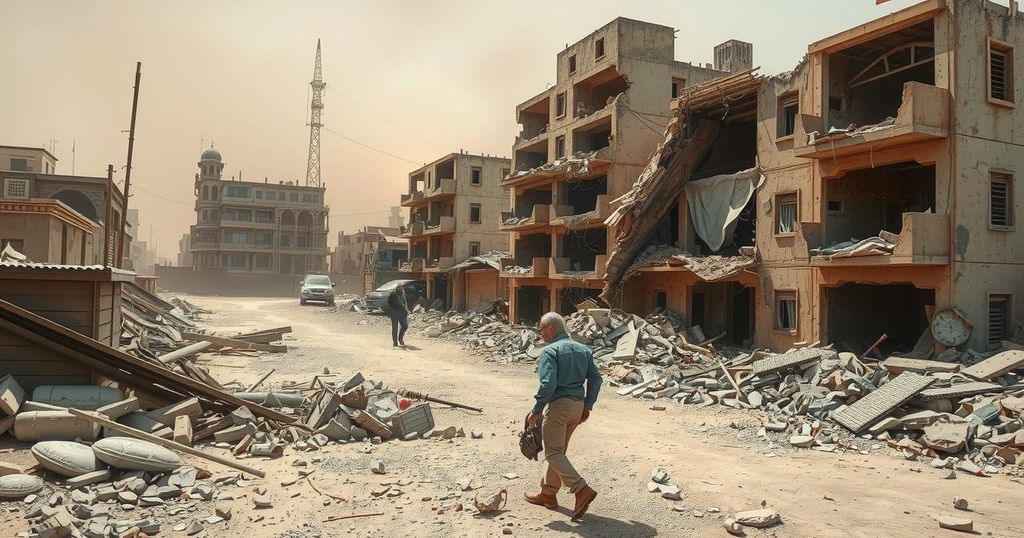Escalating U.S. Bombing in Yemen Heightens Humanitarian Crisis
The recent escalation of U.S. bombing in Yemen, targeting the Houthi movement, has worsened an ongoing humanitarian crisis due to increased civilian casualties and significant aid cuts. Observations and reports indicate that the airstrikes are severely affecting the population and further complicating humanitarian efforts. Aid organizations face immense challenges amid intensified violence, raising serious concerns about the future of assistance in the region.
The intensification of the United States bombing campaign in Yemen has exacerbated an already critical humanitarian crisis, following significant cuts to aid during President Donald Trump’s tenure. Local residents, humanitarian workers, and human rights organizations report increased civilian casualties and widespread destruction. “Now the rampant bombing has started, you never know which way things will go,” stated Siddiq Khan, country director for the aid charity Islamic Relief.
Over the past two weeks, U.S. airstrikes have targeted the anti-Western Houthi movement, which controls much of Yemen, with plans to punish them for alleged attacks on commercial shipping in the Red Sea. The strikes represent the initial military action under the Biden Administration, following President Trump’s earlier military strategies.
Public details regarding this military campaign emerged inadvertently through a journalist mistakenly included in a private group chat of U.S. officials, revealing discussions of early operations and their consequences on the ground. U.S. National Security Adviser Mike Waltz noted the killing of a key Houthi figure, although it remains unclear if civilians were affected in the process.
Key areas targeted in the strikes include the Yemeni capital of Sana’a and the port city of Hodeidah. The humanitarian impact assessment is challenging, particularly since the Houthi authorities restrict access to affected locations. According to Niku Jafarnia from Human Rights Watch, “There is no question there are civilian casualties. Residential areas are being hit in the middle of the night.”
Claims from the Houthi-run Saba news agency allege the U.S. has bombed hospitals and civilian infrastructure, with independent organizations corroborating reports of significant civilian harm. The Yemen Data Project noted that 25 civilians, including children, perished during the first week of this military action, with half of the strikes reportedly targeting non-combat sites.
The decade-long conflict in Yemen has devastated the country’s economy, leaving millions in dire need of assistance. Approximately 19 million people are reliant on aid, with UNICEF stating that half of all children under five suffer from malnutrition. Amidst this crisis, humanitarian efforts are struggling due to reduced funding and legal constraints on aid operations after the Houthis were classified as a terrorist organization by the U.S. administration.
Khan highlighted that the current airstrikes further strain a collapsing aid sector, jeopardizing operational capacities. “Overall, there has been a gradual but sharp decline in humanitarian aid to Yemen,” he remarked, citing decreasing support and rising fears for aid workers amidst intensified violence.
Another anonymous aid worker expressed concern over the compounded challenges faced in delivering services amid a continuing bombing campaign, further pressured by the Houthi group’s restrictions on operation and access to communities.
The situation in Yemen reflects a multi-faceted humanitarian crisis, where Washington’s military actions underscore the need for a comprehensive and sustainable resolution to the protracted conflict. The operational effectiveness of these strikes on the Houthi movement remains under scrutiny, as they continue to endure despite ongoing military operations.
The U.S. bombing campaign in Yemen has aggravated an already severe humanitarian crisis, resulting in numerous civilian casualties and increased hardships for millions dependent on aid. The collapse of funding and legal risks imposed on humanitarian organizations complicate their operations further. With vital infrastructure being targeted and local populations suffering immensely, the prospect of a sustainable resolution to Yemen’s conflict seems increasingly challenging.
Original Source: www.theguardian.com








Post Comment